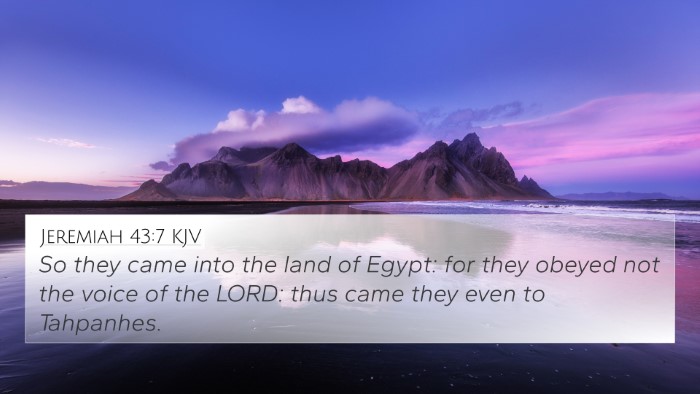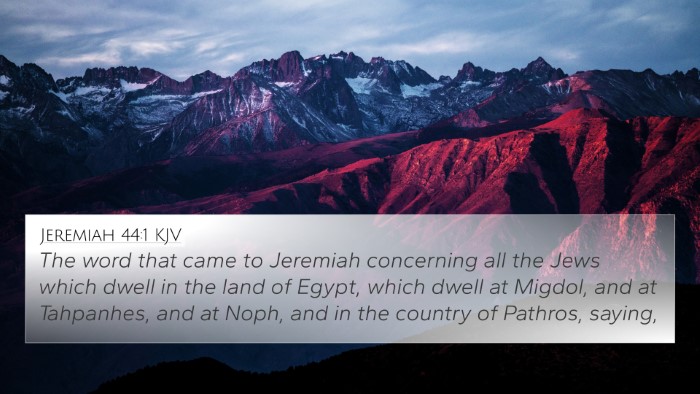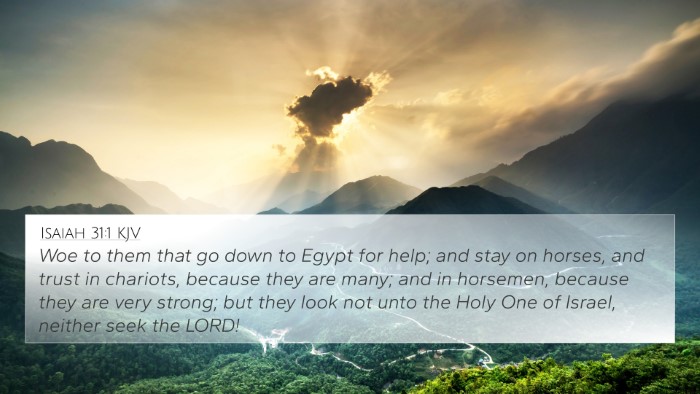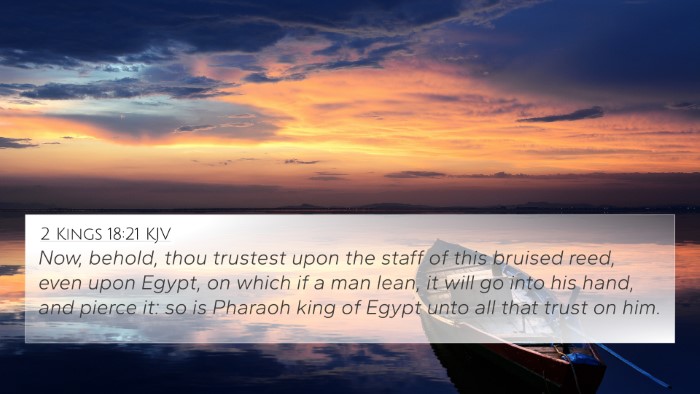Understanding Jeremiah 2:16
Jeremiah 2:16 states: “Also, the children of Noph and Tahapanes have broken the crown of thy head.” This verse speaks to the disgrace and shame that Israel has brought upon itself by turning away from God and trusting in nations like Egypt.
Summary of Meanings
This passage reflects the theme of betrayal and judgment. The prophet Jeremiah uses vivid imagery to convey how other nations, represented by Noph and Tahapanes (cities in Egypt), have caused Israel to suffer humiliation. The “crown of thy head” symbolizes Israel's glory and sovereignty, which have been tarnished due to their idolatry and dependence on foreign powers.
Insights from Commentaries
-
Matthew Henry: He explains that the “children of Noph” and “Tahapanes” refer to cities in Egypt where the Israelites sought refuge and support, thereby forsaking their trust in God. Henry emphasizes the idea that reliance on other nations leads to disgrace and a loss of divine protection.
-
Albert Barnes: Barnes elaborates that the reference to these Egyptian cities highlights the failure of Israel to seek help from the Lord. The verse serves as a warning against foreign alliances, which often lead to spiritual compromise and judgment from God.
-
Adam Clarke: Clarke adds context by indicating that this passage illustrates the shame faced by the people of Israel as they sought assistance from those who themselves were not blessed by God. He also discusses the historical significance of Egypt as a former place of bondage and how Israel’s reliance on it for help reflects their spiritual decline.
Bible Verse Cross-References
To fully comprehend the depths of Jeremiah 2:16, it is important to examine related verses that explore the same themes:
- Isaiah 31:1: “Woe to those who go down to Egypt for help…” - This verse warns against relying on Egypt, echoing Jeremiah's concerns.
- Hosea 5:13: “When Ephraim saw his sickness, and Judah saw his wound, then went Ephraim to the Assyrian…” - It reflects the same idea of misplaced trust in foreign powers.
- Psalms 60:11: “Give us help from trouble: for vain is the help of man.” - This verse underscores the futility of seeking human assistance.
- Jeremiah 17:5: “Cursed be the man that trusteth in man, and maketh flesh his arm…” - A clear indictment against human reliance, paralleling Jeremiah 2:16.
- Micah 7:5: “Trust ye not in a friend…” - This verse cautions against trusting those who are not aligned with God's purpose.
- Proverbs 3:5-6: “Trust in the Lord with all thine heart; and lean not unto thine own understanding.” - A direct encouragement to put faith in God over men.
- Isaiah 30:1: “Woe to the rebellious children, saith the Lord, that take counsel, but not of me…” - This warns against disregarding divine guidance.
Thematic Connections and Analysis
The themes presented in Jeremiah 2:16 resonate throughout the Bible. Here’s a deeper look at how this verse connects with broader scriptural messages:
-
Betrayal of God’s Covenant: Jeremiah serves as a clarion call for Israel to return to fidelity to God, contrasting their current state with the Lord's previous blessings.
-
Idolatry and its Consequences: The act of seeking assistance from nations symbolized an abandonment of true worship, aligning with the consistent biblical narrative that warns against idolatry.
-
The Role of Prophets: Jeremiah, like other prophets, acts as an intermediary to bring forth God’s message, illustrating the vital role of prophetic voices in guiding the people back to righteousness.
Exploring Cross-Referencing and Thematic Connections
For those interested in deepening their understanding of the Bible through cross-references, consider these tools:
- Bible Concordance: An invaluable resource for finding themes and words throughout the scripture.
- Cross-Reference Bible Study: A method that enhances comprehension of connections between different Bible passages.
- Bible Reference Resources: Tools that assist in linking Bible scriptures and understanding thematic dialogue.
Conclusion
In conclusion, Jeremiah 2:16 is a powerful reminder of Israel’s failures in trusting human alliances over divine providence. The commentaries of Matthew Henry, Albert Barnes, and Adam Clarke provide rich insight into the complex dynamics of this verse, allowing believers to reflect on their own spiritual reliance. Employing cross-referencing can enhance understanding, facilitating a greater grasp of both the specific and thematic connections across the Scriptures.
References to linking Bible scriptures can be enriching. This verse encapsulates a call to fidelity, urging believers to seek guidance exclusively from God.
















